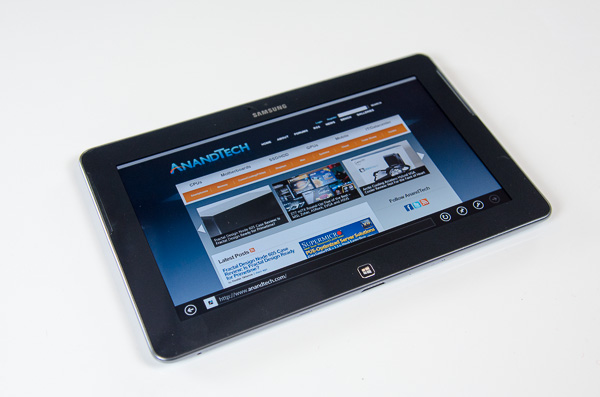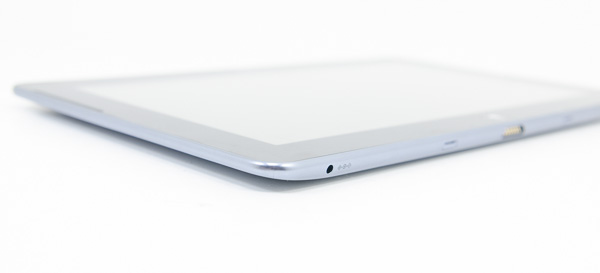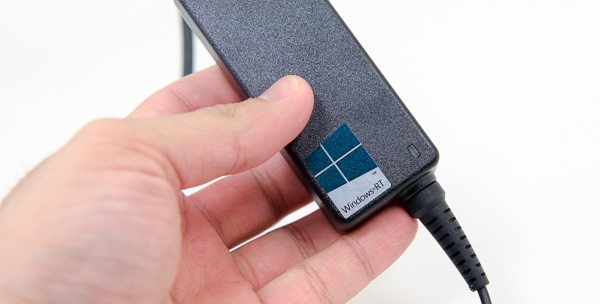Samsung ATIV Tab Review: Qualcomm's First Windows RT Tablet
by Anand Lal Shimpi on January 3, 2013 6:00 AM EST- Posted in
- Tablets
- Samsung
- Qualcomm
- Mobile
- Windows RT
Final Words
With better battery life than Surface RT and better performance as well, I have to say that in the ARM camp Qualcomm's APQ8060A is definitely the preferred SoC for Windows RT today. Qualcomm's single threaded performance advantage is obvious in interacting with the ATIV Tab, particularly for any work on the desktop (modern UI remains fairly smooth across all platforms). Application performance and web browsing performance are at worst equal to NVIDIA's Tegra 3, but at best are tangibly better. Intel continues to have the overall performance advantage (not to mention backwards compatibility), but at times Qualcomm remains surprisingly competitive in many of our tests.
Ultimately even Atom isn't quick enough to fulfill the dream of having a tablet that can really replace a modern notebook, and that's where the Windows RT/8 cookie crumbles for now. I suspect that once we get to the next generation of SoCs we'll see a better story from all of the vendors (22nm Atom, Cortex A15 based Wayne, Krait 200/300 from Qualcomm).
The ATIV Tab itself feels fairly well executed. Its performance is snappy (for Windows RT) and unlike my W510 experience, I didn't encounter much instability during my use of the Tab. Battery life is better than any other Windows RT or 8 tablet we've tested thus far. The Samsung/Qualcomm combination excels in video playback battery life in particular, giving us the first 10-inch tablet capable of lasting as long as a modern iPad in our video playback test. Web browsing battery life is also quite competitive, equaling the Clover Trail based Samsung ATIV Smart PC.
The 10.1-inch form factor and light weight construction make the ATIV Tab a device I wouldn't mind carrying around. Camera quality unfortunately isn't very good overall, particularly in low light situations. Thankfully, unlike most other Windows RT/8 devices we've tested thus far, the ATIV Tab does a great job when it comes to WiFi performance - equaling competitors from Apple and Google. Display quality is competitive with other Windows RT/8 tablets, but it does lag behind the iPad 3/4. If you absolutely need to buy a Windows RT tablet today and value performance more than design/build quality, the ATIV Tab isn't a bad option.
Although I like the ATIV Tab, I still feel like Windows RT/8 and the first generation of tablets need another iteration before they're truly ready for duty. I'd love to see the Surface team's industrial design paired with a faster SoC, a lighter chassis and a more cohesive OS. Windows RT/8 still feel rushed to me (for reasons I've explained before), let's hope that Windows Blue ships on time this year and delivers a more polished and complete experience.













42 Comments
View All Comments
snoozemode - Thursday, January 3, 2013 - link
Microsoft should really focus on merging WRT and WP8, and that rather quickly. It's a strange idea to try have one OS for every device type when so much converging is going on in the hardware world. As it stands today it seems Microsoft is missing out on the big 5"+ 1080p wave going on in the Android world because of no support for that resolution and also missing out on the now popular 7" tablet format because WRT just doesn't seem made for that experience.tipoo - Thursday, January 3, 2013 - link
I agree, it's kind of odd. Android runs on both phones and tablets of all sizes, iOS runs on iPhones and two tablet sizes, why does Microsoft feel the need to have a completely separate phone OS and tablet OS? Sure, Windows Phone 8 moved to the newer Windows kernel and got a lot of the same APIs and such as regular Windows, but it's still a distinct OS from RT.One OS for both would increase the potential market for developers as well as make developing easier.
tipoo - Thursday, January 3, 2013 - link
Besides that, I also believe that on tablets Windows x86 will become dominant over RT.Silent_Rage - Thursday, January 3, 2013 - link
I wouldn't be too sure of that: http://hal2020.com/2013/01/02/there-is-no-arm-in-w...ninjacut - Thursday, January 3, 2013 - link
The big advantage of RT over x86 is the lack of legacy application baggage that could bog down the experience plus the security.But to your point, x86 will be preferred choice if legacy applications and in general full compatibility is required.
B3an - Saturday, January 5, 2013 - link
You both forget that MS are the only company to have one single OS thats runs on both tablets and PC's. Apple, Linux or Google don't have this.Windows Phone is by far the best phone UI out there in my opinion partly because it's specifically made for smaller phones. The Win 8/RT UI wont scale down well for phones with small screens.
But the Windows Blue update, released later this year, is meant to have support for smaller 7" tablets. It's inevitable that MS will support these at some point anyway. You have to remember they've been busy with the massive task of getting Windows to work well on tablets, porting Windows to ARM, and porting WP to the Windows 8 kernel. They just haven't had time for smaller tablet support yet.
Being as WP and WIn 8/RT all have the same kernel and most of the same API's, including the same DirectX, then it's already pretty easy for most dev's to support all platforms. Things will be even more toughly integrated across platforms in future updates.
virtualx - Saturday, August 31, 2013 - link
Ummm... Canonical have been making Ubuntu (GNU/Linux) for smartphones and tablets for quite some time now. And Debian has been available for ARM since ARM began existing. Microsoft has never been the first or only company to do anything....Kevin G - Thursday, January 3, 2013 - link
MS is busy spinning off part of their desktop OS as a tablet OS while keeping their existing phone OS. The goal of a unified interface across all three markets makes sense on paper but MS has to deal with the legacy desktop paradigm hampering their desktop initiatives.On the more positive side of things, MS looks to be merging the development side of desktop, tablet and phone rather well. It isn't perfect (unnecessary legacy desktop API's have crept into tablets) but clearly superior to having independent SDK's.
As for lack of 1080p support in Windows 8/RT tablets, I think that that is more of an OEM issue than a software one on MS side. Atom based tablets should handle it (and the 10W Ivy Bridge ones due out shortly definitely can). There are GPU's on the ARM side that can handle such resolutions, though they would require Windows RT drivers etc.
snoozemode - Thursday, January 3, 2013 - link
I completely agree that the unified user interface Microsoft is trying to force on to all device types (read desktop) is a bad idea, for example i now have 40 tabs open and 5 programs that i need to switch between to do work, would just be completely impossible to operate with touch and the metro interface. But what is even worse is that they are taking the unified user interface approach with the help of 3 separated operating systems. The best solution would obviously be the complete other way around, one operating system with different user interfaces for different screen sizes and user experiences. Like Anand wrote some time ago, they are doing what they did with Windows mobile, just in reverse.I'm quite sure WRT technically supports 1080p, but WP8 is definitely not. And when it comes to form factor it is clear that the user interface in WRT is designed for a ~10" horizontal device wheras WP8's user interface would work with smaller and vertically held tablets. But these are is just two small things why merging WRT and WP8 makes sense. The big things are obviously removal of duplicate developing, for Microsoft themselfs aswell as for developers, easier marketing, less confusion and easier adoption among consumers etc etc.
Silent_Rage - Thursday, January 3, 2013 - link
I believe this is the general idea behind Windows Blue. It should have happened last year, but I got the distinct feeling (based on various news stories) that Sinofsky was somehow delaying this or playing hardball with the WP division. It has to happen SOONER rather than later, that's for sure.